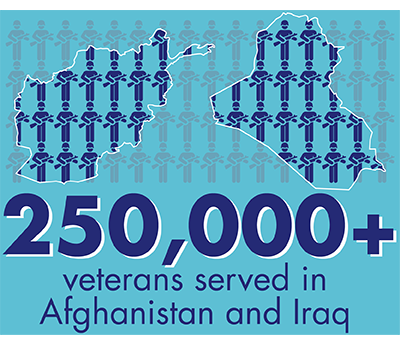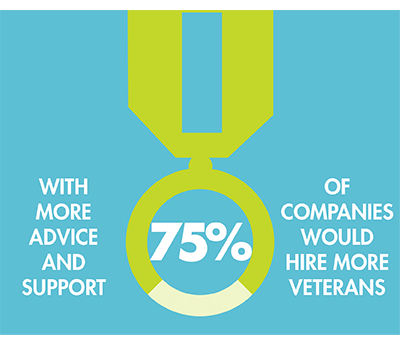The Military Mind Symposium: Benefiting from Veterans in the Workplace

Yet there are employers wary of hiring someone who may have been one of the over 250,000 veterans who served in Iraq and Afghanistan, fearing they will bring mental health issues into the work environment.
Challenging Preconceptions
Unfortunately, the preconception also still exists that a military background makes a job candidate inflexible in their thinking or bullying in their management style. That’s why leading veterans’ charity Combat Stress, in partnership with Thales UK, is hosting the third annual “Military Mind” business symposium in London on Tuesday 9th May 2017.
The purpose of the event is to bring together leading experts in the field of psychiatry and post-traumatic stress disorder, businesses that already employ veterans and decision-makers from the corporate world, to swap notes and dispel the myths and misconceptions surrounding ex-service employees.
“We know from our own experience that veterans can be a great asset to the workforce. This symposium is a chance for business leaders to hear about the advantages of hiring veterans and learn about the issues they may come up against from those transitioning to civilian roles, while also gaining valuable insight into the support available to them. It is equally valuable to corporates who have recognised the need to be aware of mental health within the wider workforce."

A poll of 500 of the UK’s top business people carried out in 2015 showed that more than half of those surveyed (54%) were reluctant to hire veterans because of fears they may suffer from mental health issues, yet three-quarters (75%) say they would hire more veterans if they had expert advice on how to understand and support them in the workplace.
Combat Stress is the UK’s leading mental health charity for veterans, having helped more than 100,000 ex-Service personnel since the charity was founded in the aftermath of the First World War. More than 6,000 ex-service men and women across the UK are currently registered with the charity, including more than 2,800 who served in Iraq and Afghanistan.
However, Robert Marsh, the charity’s director of fundraising, was keen to put that figure into context:
“Our main aim for the symposium is to provide a sense of proportion about mental health issues as a result of service in the military.
“For most veterans, their time in the military was an extremely positive experience. However, there is a significant, but small, percentage of people who have difficulty transitioning to civilian life or experience mental health problems. This is no different to the proportion you’d expect in the civilian population, but Combat Stress is there to provide a support system for them.”
The Need for Your Ongoing Support
The very word veteran implies a grizzled “Uncle Albert” from the BBC comedy Only Fools and Horses or a red-faced Sergeant Major, but the youngest veteran being supported by Combat Stress is 18 years old. Most of the charity’s current referrals are still Northern Ireland veterans who typically left the Army more than 12 years ago, but a new generation of younger Afghanistan veterans are also coming forward, seeking help. Currently, Combat Stress is supporting 971 veterans who served in Afghanistan and 1,185 from Iraq.
“Veterans now recognise they have commitments to family and work and they want to get better quickly,” said Robert. “They’re motivated to get well.”
The Military Mind Symposium is about sharing best practice to ensure more companies know how to support veteran employees through potential mental health issues. It also aims to showcase the skills and personal qualities that veterans can bring to the civilian workplace.
Robert, who has a service background in the British Army, said:
“Veterans bring a wealth of transferrable skills to business. They have a lot of experience in team work; you can’t operate in the military without working well as a team. They also tend to be flexible and adaptable, are very goal orientated, and many have inherent leadership skills at all levels.”
He added: “A colleague at Barclays’ Armed Forces Transition Employment and Resettlement (AFTER) Programme told me a painting and decorating company he works with just can’t recruit enough veterans. They have all the skills the employer’s look for.”
A Bright Future
Helen Gardiner is Site Manager for Thales’ fast jet simulator training at RAF Linton on Ouse. The former Squadron Leader joined Thales in 2013 after a 23-year career flying the Tornado in a front-line squadron and training new generations of pilots. She said: “There is an old stereotype of the ex-military type, but that’s just not the case anymore. There’s much more scope in the military now for people with many types of personalities to have a successful career. “At Thales, many people don’t think I’m ex-military. They just accept me as an individual.”
Tim Green joined Thales UK in January as Export Sales Manager for north-east Europe, after a 34-year career in the Royal Navy. His transition from the Senior Service to “Civvy Street” was smooth. “Fortunately, I was able to make use of the Navy’s extensive programme to help retiring personnel get accustomed to the civilian workplace,” he said. “And in Thales, they work with a lot of service people, so they’re used to them.”
However, Tim did see prejudice elsewhere: “In other companies, I looked at, I saw some preconceptions that we would be bombastic, loud and wanting to take charge - not listening and barking orders.” The former Commanding Officer of the Vanguard class Trident submarine HMS Vigilant added: “I think some people also felt intimidated by the CV.”
Making a Significant Contribution

The Military Mind symposium is taking place on Tuesday 9th May 2017, 9 am - 2:30 pm, at 1 America Square, EC3N 2LS
Robert Marsh is looking forward to a successful symposium: “We hope senior directors and HR people, as well as occupational health people, will come to this event with some big names from the FTSE and defence sector. We want to carry this on into the future.”
He was grateful that Thales is supporting the event for the third year: “We wouldn’t have been able to run the symposium without Thales supporting it. Being a big defence contractor, they see the great value of having veterans in the workplace.”
More information about the work of Combat Stress can be found on their website.
For more details about the Military Mind Symposium, please visit themilitarymind.combatstress.org.uk or contact Garry Burns via email or telephone 01372 587 158.